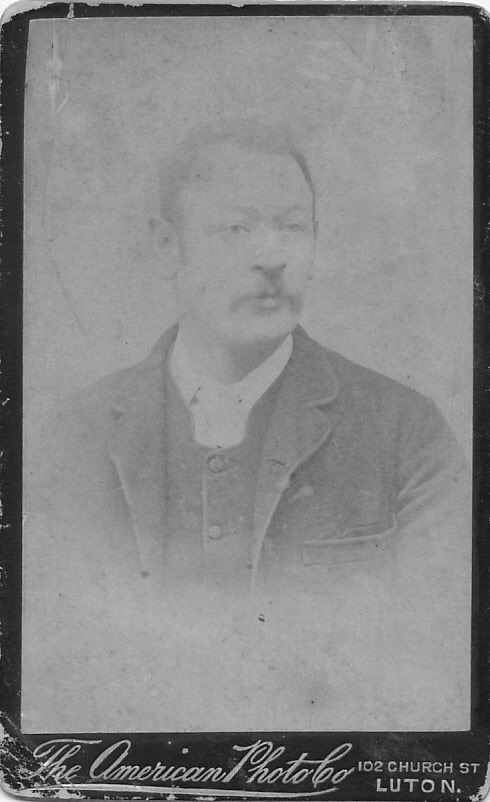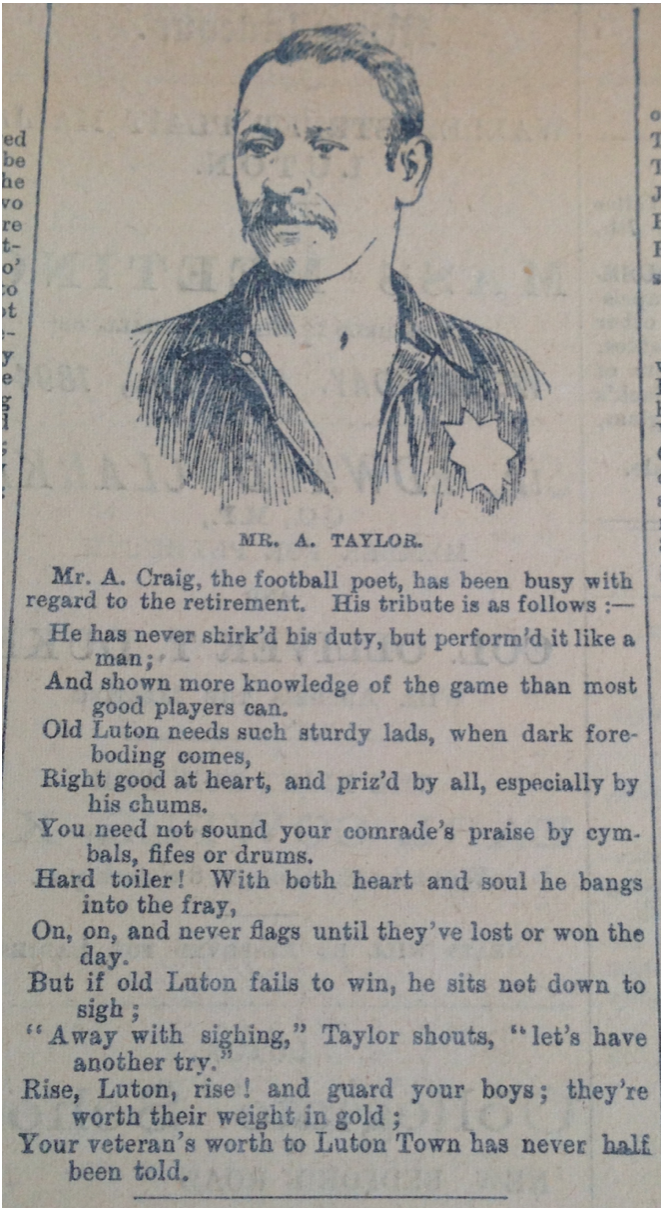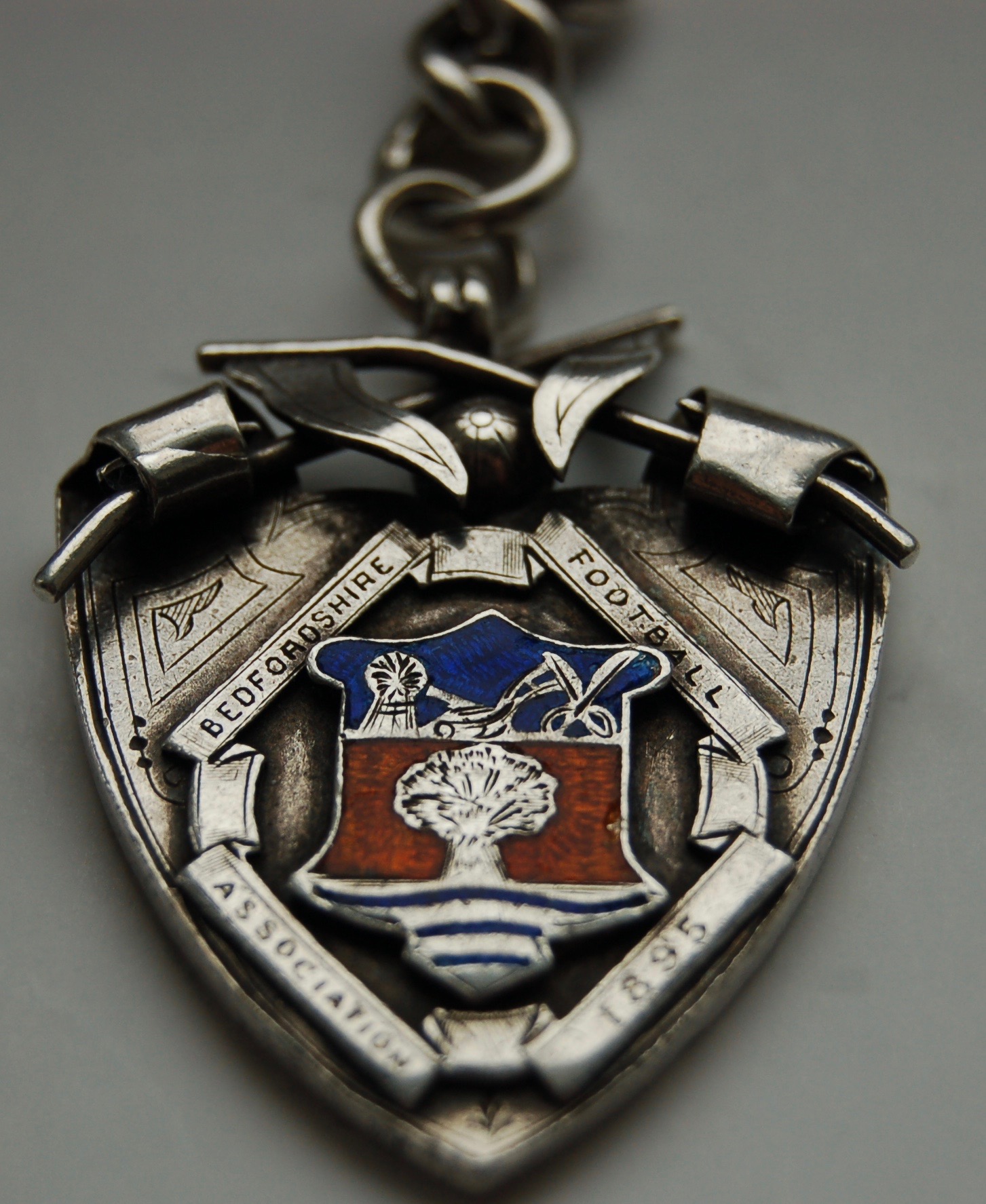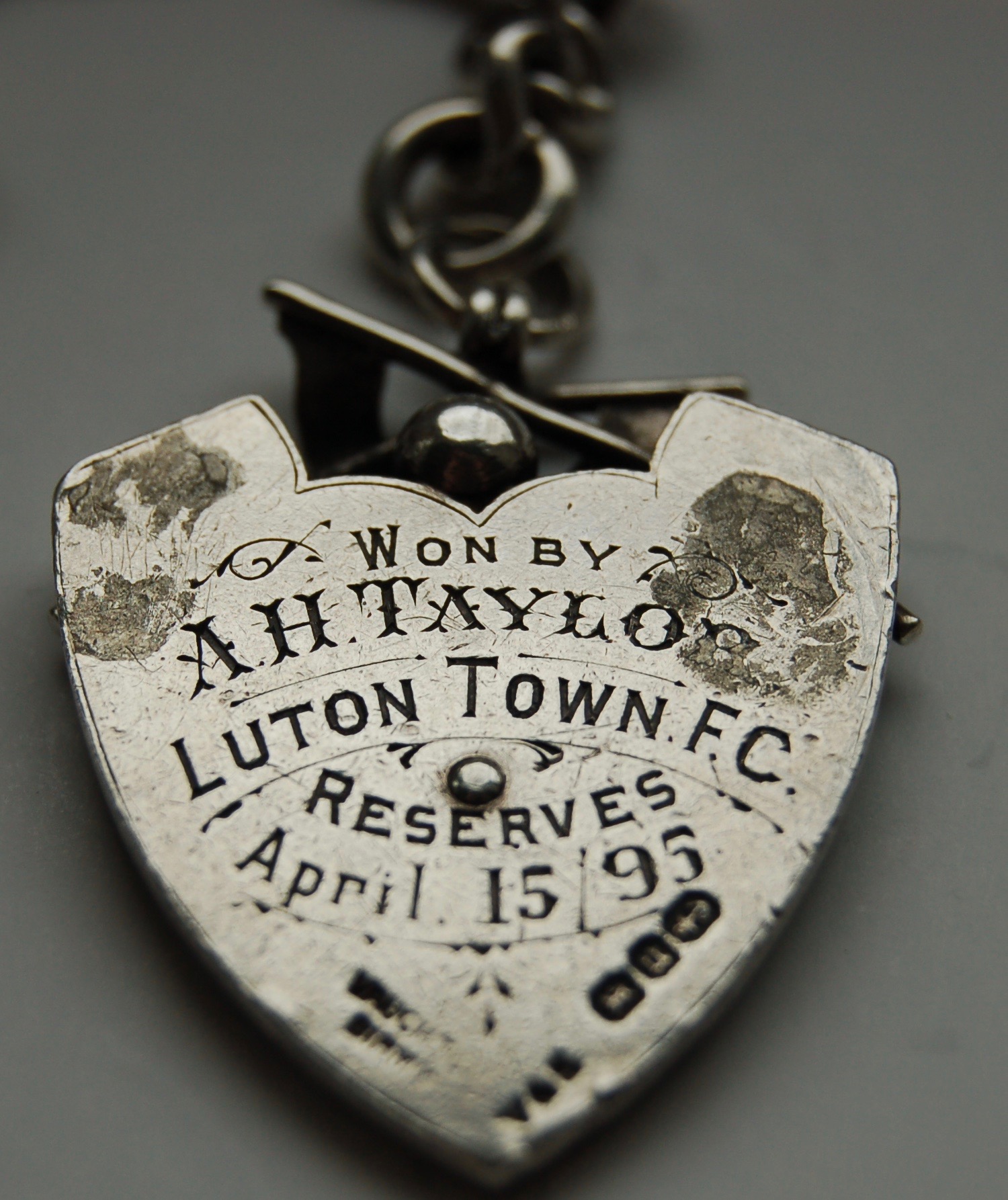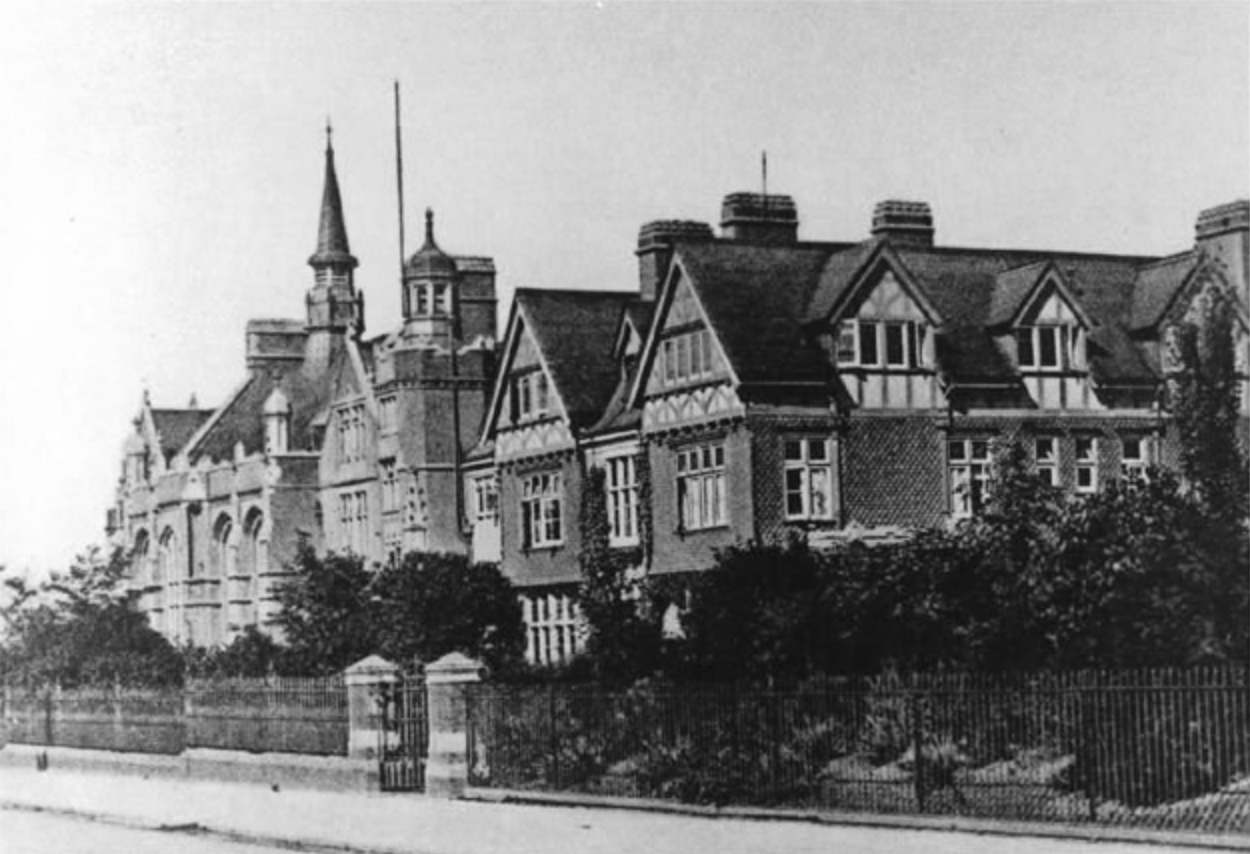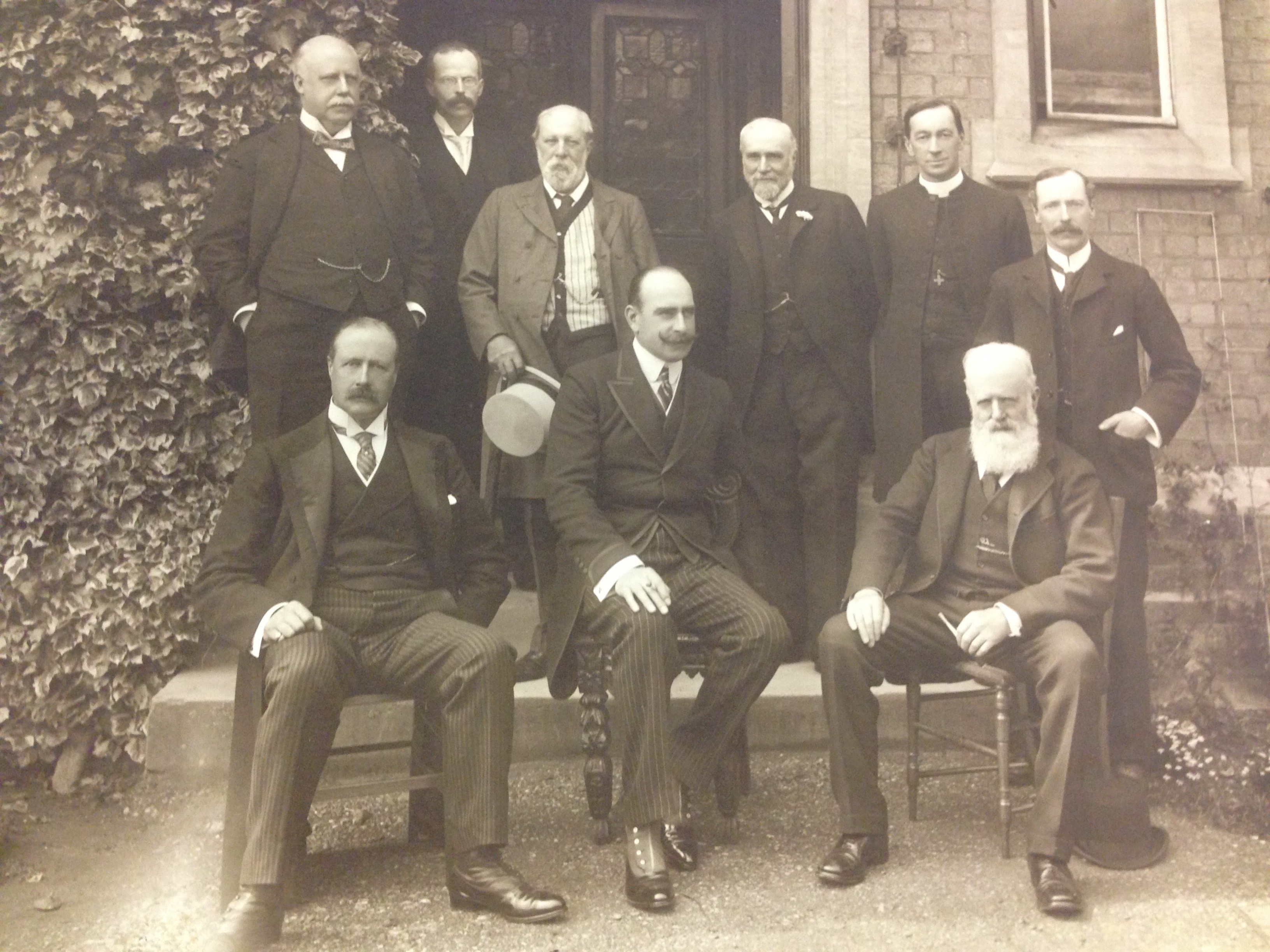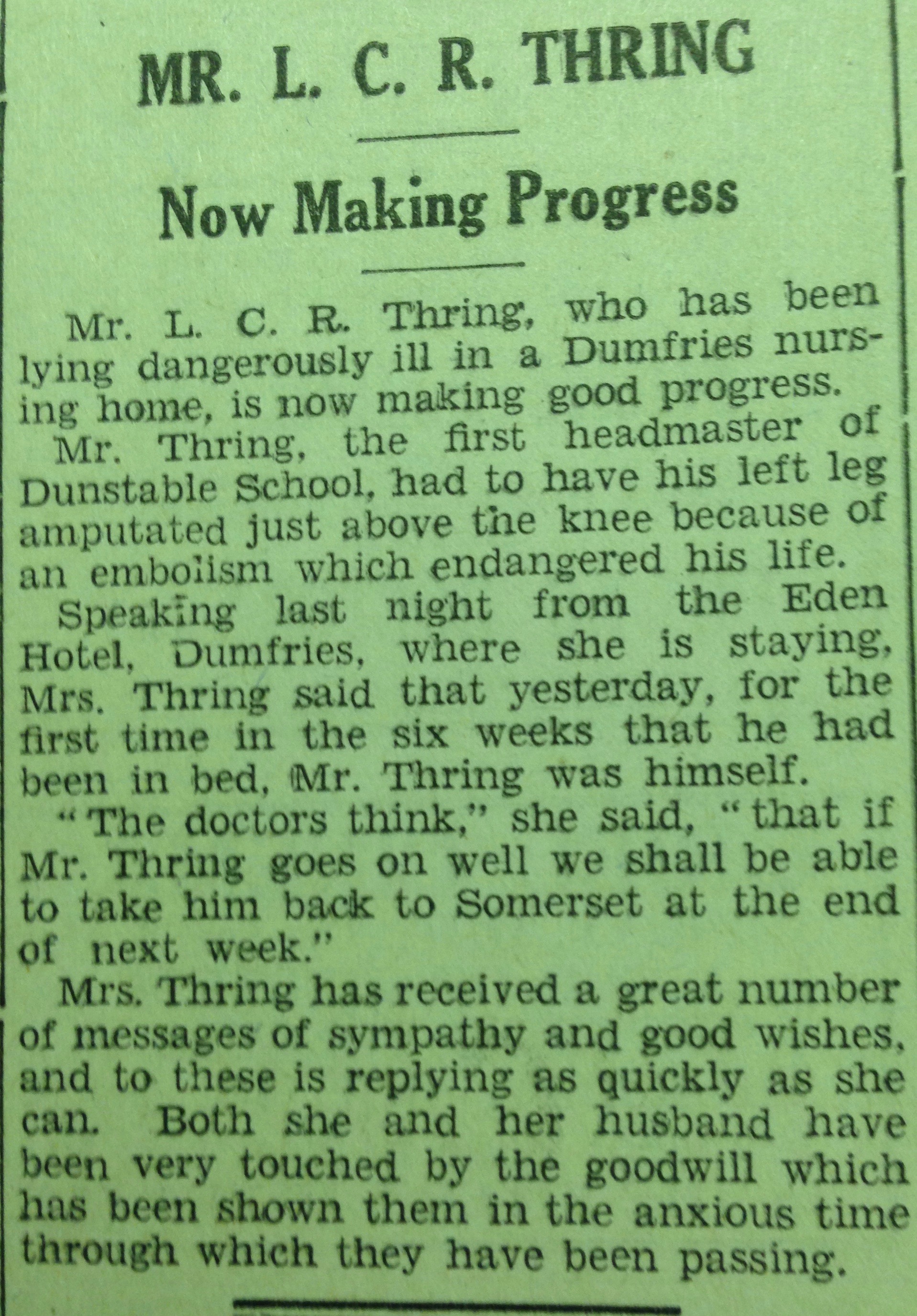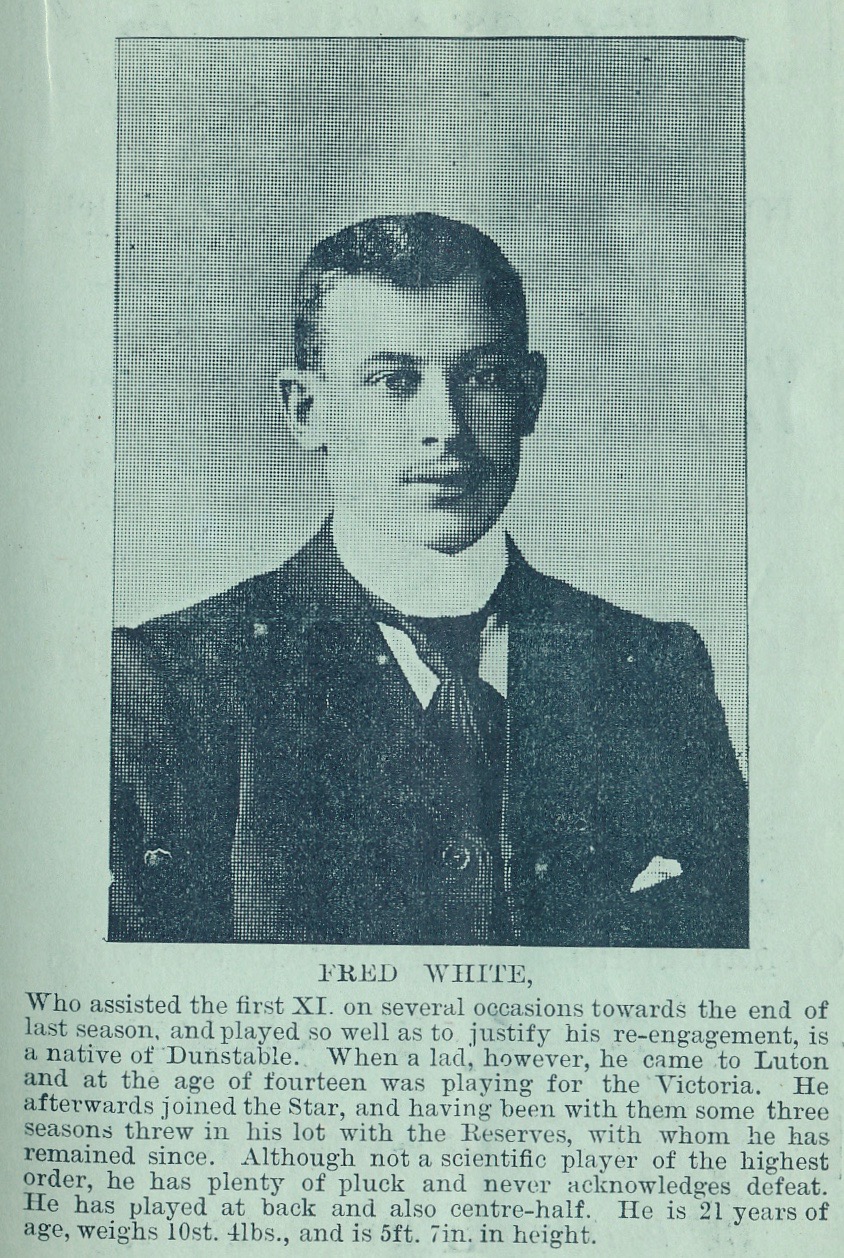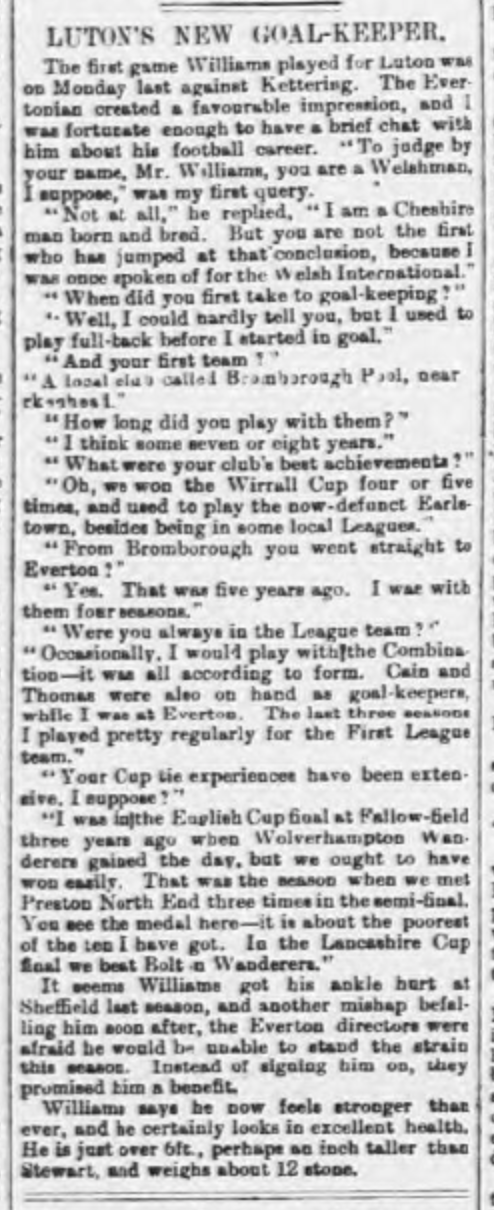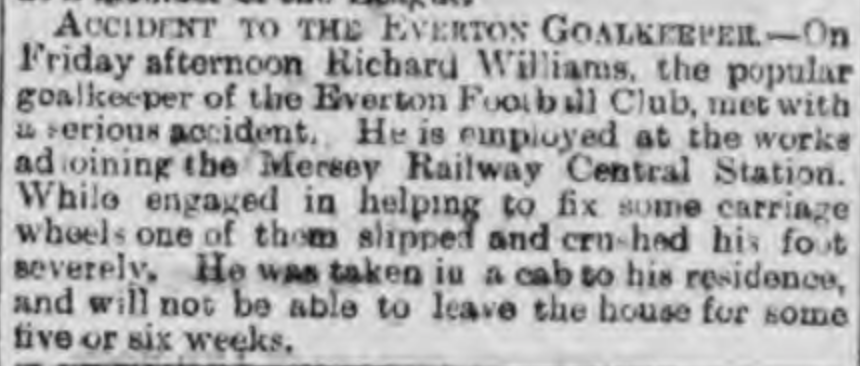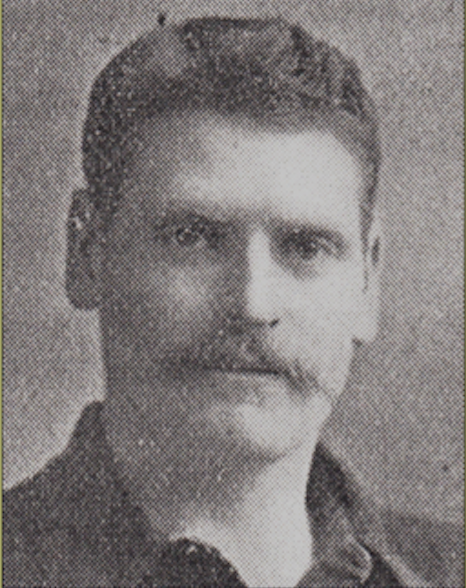ARTHUR HOLEY TAYLOR
Arthur was born in Market Rasen, Lincolnshire in 1860. He married Ann on the 17th July 1881 in Bedford. They had two daughters, Annie born in 1883 and Mabel born in 1885.
We are fortunate in having a biography from the Luton News of November 1892.
“The first time the popular captain played in Bedfordshire was ten years ago at Luton, for Bedford against the Wanderers. He was afterwards captain of the Bedford team, and was occupying that position when they were in the final for the Wellingborough and District Cup. Rushden then beating them by a goal to nil, and he was also included in the team for for Bedfordshire against Huntingdonshire two or three times. He played for the Wellingborough and District Cup Association in their county matches on several occasions, and likewise in their trial matches North v South. Mr Taylor has had the honour of representing the East Midlands in their county matches with London, Cambridgeshire, Oxfordshire and Lincolnshire. In addition to this, Mr Taylor was identified with Luton football before the Town Club came into existence, having played for the Wanderers and the old Excelsiors, but of course it is for his services in connection with the Town Club that he has made himself best known and appreciated by Lutonians. He has played for the town ever since the formation of the club, and took part in the final for the Kettering Cup two years ago against the Grantham Rovers. As captain of the present team, Mr Taylor has made himself extremely popular, both with the members and with the general supporters of the Club. As is well known, his position in the field is at half-back, on the left, and he always manages to render a good account of himself, keeping, at the same time, a watchful eye on the rest of the eleven, and seeing that each one is in his proper place. The captain is a very powerfully built man, and is altogether as good a half-back as one would expect to come across in a day’s march. The best time to see the “boss” perform is when he is not quite satisfied with the work done by his forwards – and he hasn’t been on occasions – then it’s an odd thing if the opposing side are not severely put to it to save their citadel from capture. That Mr Taylor may long enjoy the position he now fills with so much credit to himself and the Club is the earnest wish of all lovers of the noble game in Luton.”
We are given more from the Luton News also from 1892.
“In 1886 he played against Derbyshire for the Wellingborough and District Association. In 1886, too, Grimsby Town F.C. having their left half-back laid up, sent for Mr Taylor to play in the final for the Lincolnshire Cup, and he, with the rest of the team, were kept at one hotel for a week before the match. He was eligible to play for Grimsby for three or four seasons. It will be news to some, perhaps, that the worthy captain is also a runner of no mean repute, having won five firsts and two seconds in quarter mile races; five firsts, three seconds and one third in 120 yards handicaps; one first in 150 yards handicap; two firsts, one second and one third in 300 yards handicaps; and two seconds in 220 yards handicaps. Among his prizes are a couple of marble time pieces, one won at Bedford valued at seven guineas and weighing over half-hundredweight, a large walnut tea tray with silver rail round, value five guineas, silver tea and coffee services, silver fish carvers, two silver cups, a silver watch, two silver cruets, a case of silver napkin rings, two silver and glass biscuit jars and other similar prizes. Not a bad record altogether.”
The newspapers did not know that the Luton Town committee had made an illegal payment to Arthur in January 1886. The first Saturday of 1886 saw Luton Town F.C. play Dulwich away at the Greyhound Hotel, Dulwich. The following committee meeting records that it was resolved that;
“Mr Taylor have 5/- for Dulwich expenses.”
This is the first mention of a player being paid. Arthur lived in Bedford and travelled to Luton by train for home games. For the away game at Dulwich he would have to leave much earlier and would have probably missed work altogether that Saturday morning. The club would have paid the train fare from Luton to Dulwich. However, the train fare from Bedford to Luton for Arthur was much less than 5/-. The only conclusion we can therefore draw is that the majority of the money was for loss of wages and therefore it must be classed as a professional payment. We have no evidence that Arthur Taylor was registered as a professional with the F.A. He definitely did not meet the residence qualification as he was not born in Luton nor had he lived within six miles of Luton for two years. Arthur Holey Taylor appears to have received the first professional payment in the South of England.
This is an important precedent as Arthur continued to live in Bedford for his entire career with Luton Town. Having received 5/- for the Dulwich game he would have expected no less for other away games. Interestingly there is no mention of this payment as a separate item in expenditure announced at the 1885/86 season Annual General Meeting. We only have the newspaper reports of the AGM which covers the financial statement read out by the Secretary. We do not have the full printed income and expenditure sheet. The payment to Taylor is not reported as a separate item by the newspaper. The committee were not that stupid. They should not have mentioned the payment in the club minute book in respect of Dulwich as it was evidence of a breach of F.A. rules. Another reason for keeping it secret was the potential envy from other players. The committee were not going to advertise a breach of the rules at the AGM – a public meeting with the press and probably some enemies present. So they hid the 5/- and any other such payments under a woolly description which was not questioned in the back-slapping atmosphere of the AGM. Each season the committee appointed two members of the committee to audit it’s own books each season.
Up to the end of the 1890/91 season, the club varied the captaincy of the team. J.C. Lomax, when he played, took that role the most up to that date. However, on the 7th September 1891, the committee made Arthur permanent captain for the whole of the coming season. He lost the captaincy when J.W. Julian joined the club in the Autumn of 1892. However, he was a great leader and continued to stir his men to greater efforts time and again. His consistency over his nine year career in the first team makes him a truly great player.
In January 1892 the London “Evening News” published an article on the club as they had reached the first round proper of the F.A. Cup. Arthur was described by the paper as follows;
“The captain of the club is A.H. Taylor, who plays left half-back. This sterling player first played for Bedford (about 10 years ago), and he was afterwards chosen to represent Bedfordshire and the East Midlands in their county fixtures. Taylor has played for Luton town ever since the formation of the club, and took part in the final for the Kettering Cup two years ago. He is a powerful half-back, sure tackler, and a good shot at goal. He keeps his team well together, and is very popular with the players as well as with the supporters of the club.”
He was also known for his long throw in.
Aged 34 and after nine years in the first team, Arthur decided to retire. The following is the Luton Reporter’s coverage of Arthur’s benefit match in May 1894;
“It was only fitting that the concluding match of the season should be intended as a benefit for Arthur Taylor, whose play at left half-back has been one of the most admirable exhibitions given by the Luton team. Mr. A. Roston Bourke [the noted referee and friend of the club], with that enthusiasm for football for which he is noted, fell into the idea and promised to bring a good London team down, and he well redeemed this. Unfortunately the weather was terribly bad, but despite this there was a good muster of sympathisers, a pronounced proportion of whom fully intended their attendance to be regarded as a token of esteem for the old player.”
The paper went on to cover the match and summarises as follows;
“Inasmuch as this will probably be the last season in which Taylor will don the colours of the Town Club we take the opportunity of presenting his portrait to readers. It is scarcely necessary to say very much regarding the veteran player : his praise is in the mouth of every football enthusiast, and none has been heard to say a word in disfavour of him. It may be repeated that the popular half-back has been prominently identified with Luton football for about 15 years, and since the formation of the Town Club he has rarely been absent from the ranks in an important encounter. During all these years his form has been consistently good, and though towards the end of this season it was apparent that the genial Arthur did not run with the same lissom movement as of old it was equally noticeable that his spirit of downright pluck and determination had not deserted him. As a half-back Taylor never posed as brilliant, but the best testimony to his usefulness is to say that the place which his retirement leaves vacant will be indeed difficult to fill. The veteran has played even under the worst of conditions, and occasions have arisen in which he was absolutely unfit to don his colours, but “never say die” was the motto which he had ever before him, and there is no single attender at the matches but fully admires this trait in his character. To mention Taylor’s engagements in matches for the Eastern Midlands some years ago would be to retail ancient history, but mention of the fact will serve to show that he has been deemed worthy of selection in the most important of local encounters. As a sprinter he has won many prizes; indeed, as an athlete he is a splendid example. Altogether the writer, speaking from a ten years’ acquaintance with Taylor, is heartily sorry to have to announce the retirement, but joins in the general chorus of praise and congratulation which has been showered upon the old player during the last few days.”
The poem below was published on the same date as his benefit match report.
At the AGM held on 28th May 1894 Arthur was presented with the proceeds of his benefit match. His presentation was the highlight of the evening and the club’s minute book says as follows;
“The next business was to present the sum of £50 to Mr A. Taylor the amount realised by the benefit match. Mr Shane (treasurer) made the presentation on behalf of the club and in a few appropriate words expressed the esteem in which Mr Taylor was held by the football public. Mr Taylor briefly returned thanks when after a few words from Mr Arnold a vote of thanks was passed to the Chairman for presiding and the meeting terminated”.
Arthur was persuaded not to retire and he played for the reserves in the 1894/95 season who won the first Bedfordshire F.A. County Cup. Arthur’s medal is below;
The 1901 census show him as a Beer House Keeper and coach body maker in Bedford. By 1911 Arthur and Ann were living with their daughter in Bedford. Arthur was a bodymaker at a Motor Works.
Arthur died in Bedford at the end of 1926.
*************************************************************************
Lionel Charles Reginald Thring
Lionel Charles Reginald Thring was born on 5th September 1862 at Uppingham, Rutland. His father was John Charles Thring, a major figure in early football. In 1848, John Charles Thring and his friend Henry de Witton, while studying at King’s College, led the initiative to draw up the Cambridge Rules of Football. Later revisions of those rules were used as a template for the F.A.’s Rules of the Game. It was therefore inevitable that L.C.R. would play football.
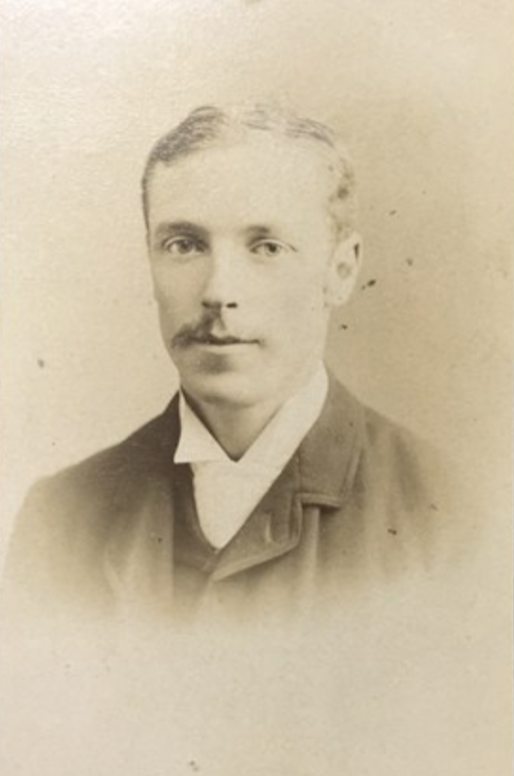
L.C.R. attended Uppingham School and Marlborough College. He obtained a degree in Theology at Cambridge University and became assistant master at Wellingborough Grammar School from 1886 until 1888. He played in the successful Wellingborough Grammar School football team that never lost a game against a Luton team. That record was not lost on Luton Town and not long after he moved to Dunstable he was asked to play in the first team. His first game was in October 1888 in the English Cup (F.A.) Cup tie against Reading at Dallow Lane . He scored in the four nil victory. He continued to play for the club until they turned to professionalism in early 1891. L.C.R. continued his association with the club by refereeing many Luton games.
He married Jessie Margaret Healing on 18th August 1888. They had three children, Elsie (born 1893), Ashton (born 1896 and presumably named after the school) and Marion (born 1899). Ashton died of flu in Ripon in 1917 (see the bottom of the page for more details).
In 1888 he became the first Headmaster of the newly built Ashton Grammar School (above right), Dunstable, where he remained until retirement in 1921. He was made Secretary of the newly formed Bedfordshire County Cricket Club in 1891.
 L.C.R. is standing on the extreme right in the above photograph. The gentleman seated centre is the Prince of Teck. L.C.R. retired in 1921 after 33 years as headmaster. The Luton News takes up the story below.
L.C.R. is standing on the extreme right in the above photograph. The gentleman seated centre is the Prince of Teck. L.C.R. retired in 1921 after 33 years as headmaster. The Luton News takes up the story below.
FROM THE LUTON NEWS OF 21ST JULY 1921;
“Thirty-three years at Dunstable Grammar School
Too few men are given greater responsibilities than to the heads of our public schools, and to few do their responsibilities bring higher hopes and more bitter disappointments. To such men are entrusted the task of moulding the lives and characters of future leaders of Government and commerce, and the principles inculcated by them must find their reflex in the national life.
Few men are more sensible of the responsibility resting upon them in this connection, than Mr L.C.R. Thring, M.A.. who has for more than 30 years filled the headmaster’s chair at Dunstable Grammar school with so much distinction. When the school closes for the summer vacation on Saturday, Mr Thring will lay aside his cap and gown with his retirement, and there will pass from active educational work one of the most prominent figures in the scholastic life f the county. Mr Thring may said to have been born in the his profession, for coming of a very old Somersetshire family, his father was a master at the famous Uppingham School, where the headmaster was his uncle, the late Mr Edward Thring, one of the greatest headmasters that England ever produced. Mr Thring attended this school under his father and his uncle at the age of nine, and after a subsequent period at Marlborough, he went up to Cambridge at 18, where he took his degree in theology. His first appointment as a teacher was at Wellingborough, where, after four years useful experience, he came to Dunstable as the first headmaster of the Grammar School in 1888.
That institution was not, however, the flourishing and popular local Mecca of education that it has since become. Not a few successful business men in the district can recall the opening day 33 years ago, when the registers contained the names of 46 day boys and three boarders. To-day there are 253 day scholars and 82 boarders The young headmaster, with the example of his distinguished uncle always before him as a guide and an incentive, centred the whole of his abundant energy and talent upon the great work of character building and the evolving of worthy citizens. Methods of teaching have undergone changes in 33 years, and the “Head” has not been reluctant to embrace improvements, but the root principle of the education has never wavered, and it is perhaps significant that during Mr Thring’s last days at school, there is still a place of honour on the wall of his study, a large portrait of the late Mr Edward Thring.
The first few years of uphill work soon bore their fruit, and there were added to the original buildings the laboratories; the big speech hall, two more dormitories, the swimming baths, the gymnasium and Ashton Lodge, where 60 boys and three masters are accommodated. During the holidays, four new class rooms, a cycle house, and appurtenances are to be erected.
It is interesting to glance over the record of what has been accomplished by Mr Thring and his loyal staff during 33 years, by a constant appeal to the highest and best that is in mankind. Here valour and intellect both find a place, and in the list figure names whose fame and worth have spread far beyond their native heath. Lieut. Col. Henderson, who won the V.C. and sacrificed his life at Kut in the late war, was a Dunstable scholar, and there is also Captain Benning R.N. D.S.O. who is now in command of the submarine squadron in the Pacific. Of the old boys who joined up, 206 received commissions, and over 60 laid down their lives. The decorations gained include a D.S.C., 9 M.C’s. 1 D.C.M., 3 M.M’s., 1 Italian Order of St. Maurice and St. Lasarus, 1 Russian Order of St. Vladimar, and 1 of St. George, 3 Croix des Guerre and 1 C.B., the latter being won by Paymaster Commander E.W.C. Thring for intelligence work at the Admiralty. Commander Thring is at present in Germany, where he has been giving evidence in the case concerning the sinking of a hospital ship during the war. On the civil side, there is Mr G.R. Andersen, who came with a free scholarship when the school first opened, and who is now a partner in the publishing house of Harrap. Mr R.J. Gladwell took an open mathematics scholarship for Cambridge, and is now a house master at Clifton. Mr E.V. Watkins also went up to Cambridge with a scholarship, and is now head of a Yorkshire grammar school. Mr P. Haswell, who, with a first in science and a second in mathematics, became senior science master in a large school, was one of four final candidates from whom the selection committee appointed the successor to Mr Thring. To bring the list quite up-to-date, W. Healing has just passed fourth out of Woolwich. In addition, all over the world there are pioneers and engineers working their way steadily up the long ladder of fame, who received their inspiration from Mr Thring. Who would deny him a little pardonable pride in the result of his life’s endeavours. The seed has borne abundant fruit, and the harvest of his efforts has ripened quickly.
An infallible test of the popularity and the worth of a school is the retention of the affection of the students in after years. Dunstable Grammar School passes this test with honours, for there is not only a strong “Old Boys” Club with monthly meetings in London, but a successful local branch with its headquarters at Luton.
Mr Thring is himself the first to admit that the work could never have been accomplished without assistance, and the valuable aid he has received from Mrs Thring is a vital factor which cannot be disassociated from the life of the school. Mrs Thring has been responsible for the domestic arrangements of the boarders, and there are many who cherish affectionate memories of the lady whose kindly aid and sympathy did so much to assuage the sorrow of parting from home. If in Mr Thring the boys found a guide, in Mrs Thring they found a friend.
Mr Thring’s activities have not been confined to the school alone. He never sought municipal honours, but preferred to work unostentatiously. For a long time he was Chairman of the Dunstable Literary and Scientific Society, and until recently was President of the Dunstable Scouts’ Association, while during the war he was Chairman of the Dunstable Military Tribunal. Mr Thring has been for many years a justice of the peace for Dunstable. It is interesting to note that Mr Thring is working with his characteristic energy right up to his last moment in office. This week he will be conducting examinations twelve hours a day. On Saturday he will be entertained by the old boys at their annual cricket match, and speech day takes pace on Monday.
TRIBUTE BY FELLOW JUSTICES
Mr Thring is a Dunstable Justice of the Peace, and his retirement was made the subject of comment at Tuesday’s Borough Sessions. The magistrates present were the Mayor (Ald. W.S. Seamons), Mr A.G. Inwards, Mr LC.R. Thring and Mr F.T. Garrett.
The Mayor said he believed it was the last occasion that the Borough Magistrates would have the pleasure of having Mr Thring as one of their colleagues. It was a matter of great regret to all associated with the police court work in any way, that Mr Thring was leaving, and they all sincerely felt the parting – (hear, Hear). Mr Thring had done his service in Dunstable nobly and well – (hear, hear) – and it was a credit to himself and a credit to the Borough. The Mayor hoped that he would enjoy the retirement which he so well deserved – (hear, hear).
Mr Thring expressed his thanks to the Mayor. He said he felt that he must attend the court that morning as it would be the last of his regular attendances at the police court. He had lived his life in Dunstable, and his interests would always be in the town. Should he be in Dunstable on any occasion the magistrates were sitting he would be glad to occupy his familiar seat. He thanked the magistrates, the Clerk to the magistrates (Mr W. Austin), and the police for the very courteous way in which he had always been received, and the way in which the business of the court had been conducted.”
THE CLIP BELOW IS FROM THE SATURDAY TELEGRAPH OF 13TH OCTOBER 1934
THE CLIP BELOW IS FROM THE LUTON NEWS OF 15TH NOVEMBER 1934
“Passing of Mr L.C.R. Thring
Long Service as Head
Funeral to-day
The funeral took place at Dunstable Cemetery this afternoon of Mr Lionel Charles Reginald Thring, M.A., J.P., formerly headmaster of Dunstable School, who died at his home at The Grange, Ash, Martock, Somerset, on Saturday.
Mr Thring, who was the first headmaster of the school, retiring in 1921 after holding the position for thirty three years was taken ill while shooting on the Scottish moors during the summer. It was necessary for his left leg to be amputated just above the knee, and he remained in a critical condition for some time. He recovered sufficiently to be taken home, but in spite of devoted nursing and care his condition became worse, his heart being unable to stand the shock and strain.
Educated at Uppingham, Marlborough and Cambridge – where he took his degree in theology – Mr Thring’s first scholastic appointment was at Wellingborough School. When Dunstable School was opened in 1888, he became headmaster, and under his guidance the size and scope of the school extended in a remarkable manner.
INTEREST IN PUBLIC WORK
His interest, during his long residence at Dunstable, were by no means confined to his school, and though he never sought municipal honours , he took a close interest in public affairs, and could be relied upon at all times to give support to any project in the interest of the town.
He was a Justice of the Peace for Dunstable, and for a long period was President of the local Scouts’ Association, receiving the “thanks” badge in gratitude for his services. During the war he was Chairman of the Dunstable Military Tribunal.
A thorough sportsman, Mr Thring played both cricket and golf, and it was not long after his appointment at Dunstable that he began to make his mark in county cricket circles. He became captain of the Beds County side, and under his wise and energetic leadership, the county club achieved a gratifying measure of success. he was one of the first members of the Dunstable Golf Club but had played golf on an improvised course on the Downs before the Club was formed.
Mr Thring’s death is greatly regretted by Old Dunstablians all over the world, who will remember him with affection and gratitude, for to all he was a real friend, as well as the “Head.” Early this year he and Mrs Thring were guests of honour at the Old Dunstablians Club dinner, and many warm tributes were paid to his ability and worth and all that he had done for the school.
Mr Thring is survived by his wife and two daughters. His only son died during the war while serving with the North Midland R.F.A.”
Thanks to;
The Luton News
For details of Ashton’s funeral see http://www.worldwar1luton.com/event/funeral-lieutenant-thring . This is a Luton Culture website devoted to World War One.
***************************************************************************
Thomas Tierney
Played for 9 clubs before he signed for the Straw Plaiters and 5 clubs after he left in 1902 . Played 54 times for the Straw Plaiters scoring 16 goals.
***************************************************************************
Joseph Clark “Connie” Watkins
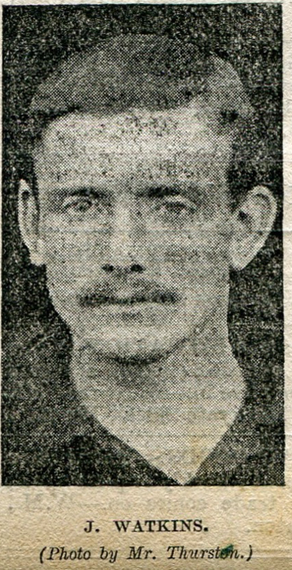 His parents, Robert and Emma, both came from Pepperstock. Joseph was born in Slip End in 1875. The family moved to Luton and lived at 125 Castle Street in 1881.
His parents, Robert and Emma, both came from Pepperstock. Joseph was born in Slip End in 1875. The family moved to Luton and lived at 125 Castle Street in 1881.
Broke into the reserves in September 1891. Debut for the first team was on the 22nd October 1892 when Chesher was injured and Connie played at inside right against Nottingham Forest. Had a good run of games in the first team that season as a forward in on the right or left. However, he was a half back. He moved there at the start of the 1893/94 season and he kept his place. The club committee agreed on the 18th September 1893 “that Watkins be signed on at once to be paid on the same terms as the other Town players from the time he commenced play”. He dropped back to half back and held his place all season alongside Julian and Arthur Taylor. He played in the final of the Luton Charity Cup in 1894 so holds a winners medal.
1891 – Straw Hat Blocker with parents at 28 Midland Road, Luton
He married Francis Morton in early 1899 and by 1901 he was still a Straw Hat Blocker living with Fanny who is aged 24 at 37 Bailey Street, Luton
1911 lived at 56 Henry Street, Luton – Straw Hatter with Frances (Fanny) who is now 36.
No record of any marriage or children.
Moved to 30 Peache Street Luton where he was residing when he passed away in 1927. The Luton News of 29th November 1927 published the photo below

****************************************************************************
Fred White
Fred played 304 games scoring 15 goals.
************************************************************************
HARRY WILLIAMS
Harry played 186 games for the Straw Plaiters scoring 5 goals.
**************************************************************************
Richard Williams
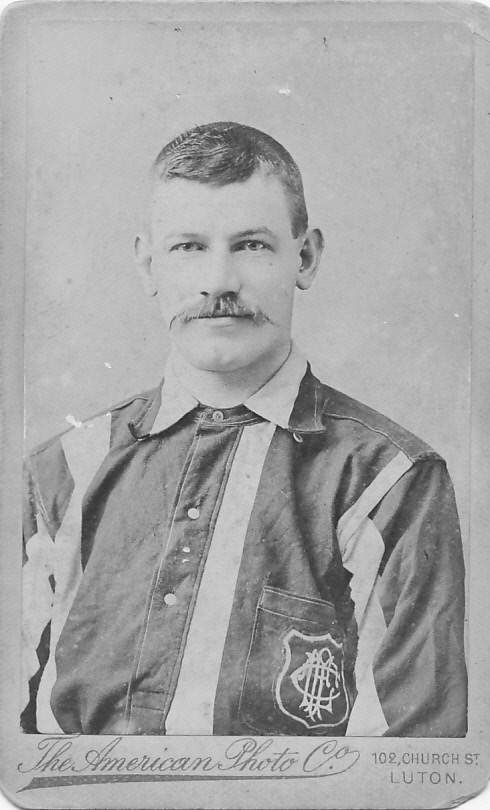 Richard signed for Luton Town from Everton in November 1895. A goal keeper, he played in the 1893 F.A. Cup Final between Everton and Wolverhampton Wanderers at Fallowfield, Manchester. The official attendance was 45,000 but it has been estimated that 60,000 were in the ground and round the edge of the pitch. Wing play was impeded by the crowd so both teams resorted to the long ball. Unfortunately a hopeful long ball caught Richard out and it sailed into the net for the only goal of the game. Some reported that Richard blamed the sun in his eyes but he did not mention this in his interview with the Luton Times published on the 22nd November 1895, below.
Richard signed for Luton Town from Everton in November 1895. A goal keeper, he played in the 1893 F.A. Cup Final between Everton and Wolverhampton Wanderers at Fallowfield, Manchester. The official attendance was 45,000 but it has been estimated that 60,000 were in the ground and round the edge of the pitch. Wing play was impeded by the crowd so both teams resorted to the long ball. Unfortunately a hopeful long ball caught Richard out and it sailed into the net for the only goal of the game. Some reported that Richard blamed the sun in his eyes but he did not mention this in his interview with the Luton Times published on the 22nd November 1895, below.
Like most footballers of the era, Richard had another job. This could be hazardous as the clip below from the Liverpool Mercury 11th July 1892 shows.
Richard has been a hard man to track down on Ancestry websites. I will persevere in my search and add anything I find. He played 78 times for the Straw Plaiters.
*******************************************************************************************
John Wilson
Born in Middlesbrough in 1867
Started his career at Middlesbrough Ironopolis before joining Royal Arsenal in 1889. He was brought to Luton in 1892 by captain J.W. Julian who carried on living in Plumstead and circulated with their players. John made his debut for the Straw Plaiters on the 17th December 1892 in a 2 0 win over Wolverton L. & N.W.. He played 19 games that first season and signed professional in early April 1893 being paid 10/- (ten shillings) a week. The following season he played 29 games. Although he did not play in the Luton Charity Cup Final of 1894, a winners medal was struck for him. He was a reliable full back who occasionally played half-back in the tough Julian style. His services were dispensed with in April 1894 as the club prepared for the Southern League. John went on to play for Wolverton L. & N.W., West Herts and Crouch End.
He died in Watford on the 23rd March 1929.



